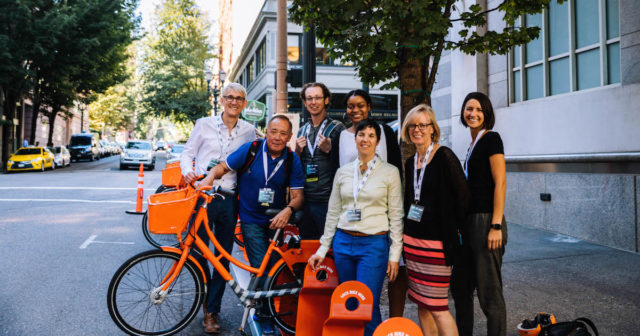2018 in bike share equity: A year-end review
by Stefani Cox
December 31, 2018

Since the beginning, bike share and micromobility have been rapidly-evolving forms of transportation. 2018 turned out to be no different, with continued equity and access efforts, the proliferation of dockless bikes, electric bikes, and the introduction of e-scooters in many U.S. cities.
Bike share throughout the country
System operators, community groups, and government staff continued to play a strong role in making bike share available and accessible throughout the year. Among the entities doing this work, Better Bike Share was happy to welcome six new Challenge Grantees and two new Research Grantees.
We also hosted the 2018 Moving Forward Together conference in collaboration with the North American Bikeshare Association, an event that brought together a cross section of professionals to discuss important questions of bike share access, outreach, technology, and policy. You can download the conference presentations and other materials here.
Connecting diverse communities
While most major cities have already implemented bike share programs, several made expansions this year that helped individuals and families outside of downtown areas make use of the systems.
Pittsburgh was one such city, which essentially doubled its number of stations, partially due to a unique strategy of halving the number of bikes at each station in order to right-size them to actual population numbers. The approach allowed Healthy Ride to expand into three new neighborhoods.
Detroit was another city that looked to broaden its bike share reach, through the creation of satellite bike share hubs for outlying dense pockets of residents. MoGo also took inspiration from Portland’s adaptive bike share pilot to bring accessible bikes and tricycles to mobility-challenged individuals.
Operator-led inclusion efforts
Discount and cash payment options on the operator end are a tried and true way to include riders struggling with finances. This year, Boston expanded its discount program to the full metropolitan region, making a $5 monthly pass available to SNAP cardholders across four separate cities.
Fare card integration is another important operator-side effort. Los Angeles took big strides in this area by combining bus, rail, and bike share payments into the same TAP fare card, and streamlining pricing as well. Cities such as Milwaukee and Pittsburgh took similar steps.
Redistributing bikes can also have an equity component, as seen with Motivate’s Bike Angels program, which allows riders who help take bikes to docks in need to donate their points toward low-income passes.
Diverse hiring practices were also topics of conversation this year, including a helpful tool from the Urban Sustainability Directors Network.
Getting the word out
As usual, Philadelphia played a strong leadership role for outreach and engagement strategies, continuing numerous rides, learn-to-ride classes, digital skillbuilding, and diverse marketing efforts. The Bicycle Coalition of Greater Philadelphia expanded into bilingual services and youth programming this year, broadening the effectiveness of established outreach methods.
Charlotte is another community where bike share events run regularly, including Pedal to Porch, a program that leads local residents to the homes of long-time community members, so that newer residents can understand the history of the area.
Better Bike Share grantees West Town Bikes of Chicago, Bike Easy of New Orleans, and Enough Pie of Charleston also worked to outreach to a variety of residents.
In a creative twist, one bike share program in Ohio is even using bikes as a library resource that can be checked out just like books.
Community organization concerns
It’s important to talk about the big challenges ahead for bike share as well. During a Twitter chat hosted by Better Bike Share earlier this year, anti-gentrification activists expressed anger at the incursion of bike share into Los Angeles’ Boyle Heights neighborhood. Erick Huerta of People for Mobility Justice (formerly Multicultural Communities for Mobility) commented on the situation through an interview.
Other concerns that arose from community organizing circles included continued profiling of riders of color, as well as the recent trend of high-level government transportation officials being lured into the private sector by dockless bike and scooter share companies.
Bike share research
The National Association of City Transportation Officials continued to provide tools and resources for cities with bike share systems, including the comprehensive Strategies for Engaging Community document, as well as a 2017 review of bike share statistics. There are also one-pagers available on Indego’s cash payment and Access Pass programs.
In addition, Portland State University released results showing that outreach and discount programs are effective for encouraging lower-income riders and riders of color to join bike share.
Dockless bike share, e-bikes, and e-scooters
Last, but certainly not least, is the much speculated upon rise of dockless bikes, e-bikes, and e-scooters.
Better Bike Share grantee Bike Walk Tompkins has taken the approach of working with dockless company Lime to pursue bike share equity goals, while several cities have big concerns about how such bikes can block the public right of way and compete with existing bike share contracts.
The Sacramento metropolitan area is one example of the embrace of pedal-assist bikes to increase ridership in hot or hilly areas, as well as for riders looking for more of a thrill.
In just the past few months, e-scooters have entered the arena. No one is quite sure yet how successful they will be, or whether they will compete or enhance existing bike share and public transportation options, as well as whether they will further equity goals.
Needless to say, it’s been a big year for micromobility, and 2019 is certain to even more to the table.
The Better Bike Share Partnership is funded by The JPB Foundation as a collaborative between the City of Philadelphia, the Bicycle Coalition of Greater Philadelphia, the National Association of City Transportation Officials (NACTO) and the PeopleForBikes Foundation to build equitable and replicable bike share systems. Follow us on Facebook, Twitter and Instagram or sign up for our weekly newsletter. Story tip? Write stefani@betterbikeshare.org.
